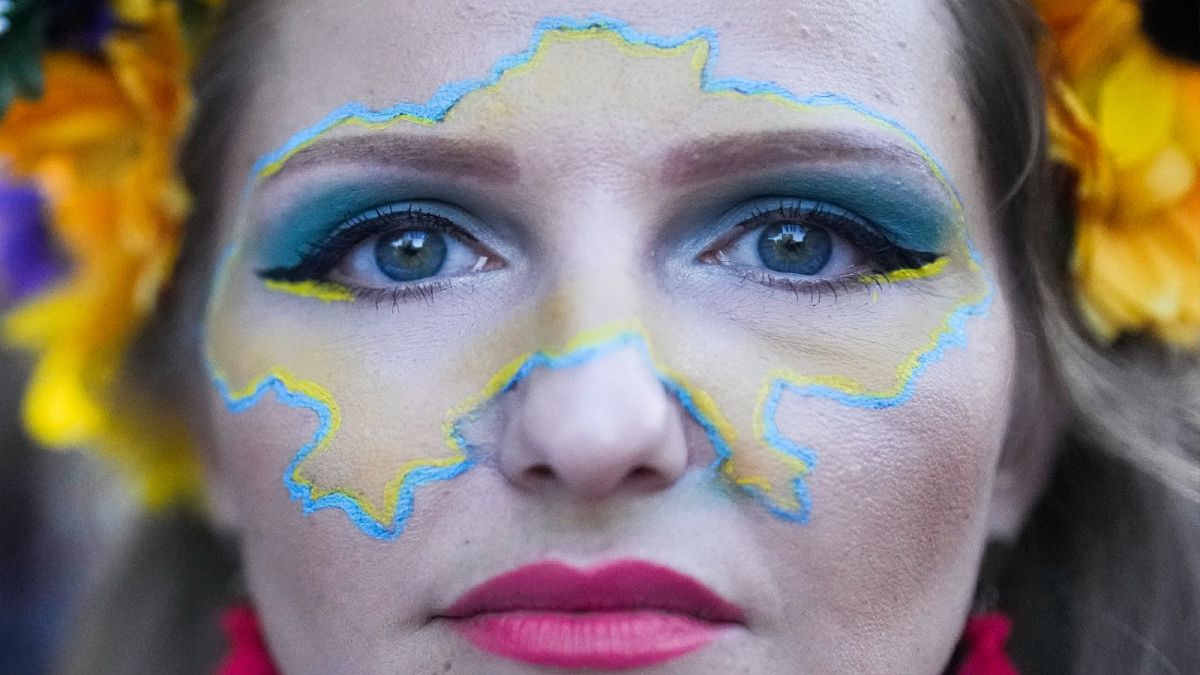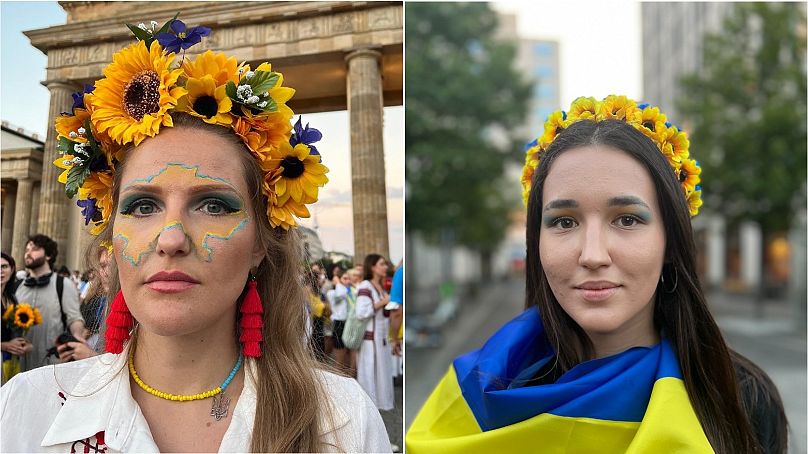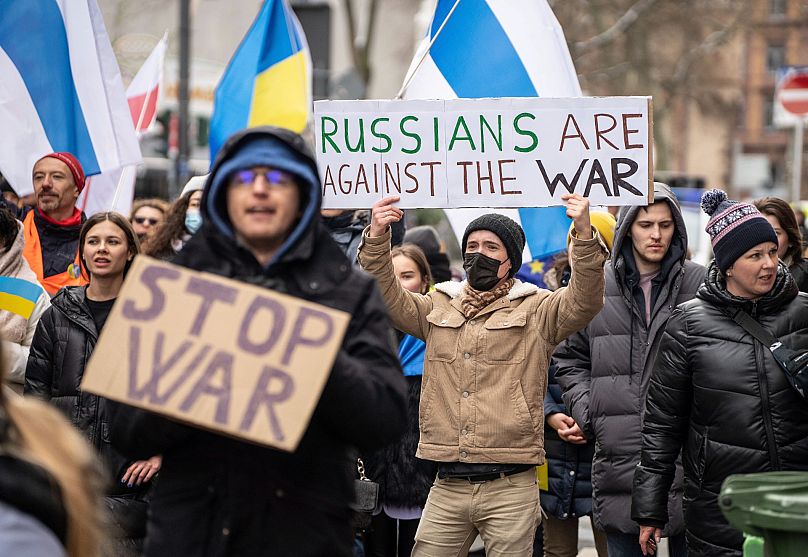Ukrainians and Russian speakers both say they have suffered threats and violence since the war began six months ago.
To the casual observer, the source of their anger was obvious.
Approaching Berlin's iconic Brandenburg Gate, the Ukrainians, festooned in yellow-and-blue, chanted "Gas embargo now" and "Russia is a terrorist state".
Marching to mark 31 years since Ukraine became independent from the Soviet Union, they wanted to remind their German hosts that Ukraine is still a war zone and that high gas prices are a small price to pay compared to Ukrainian lives.
Yet for some, below the surface, another frustration is bubbling away: the difficulty of living in Germany amid the war back home.
Activists say since the invasion in February, there had been an increase in the harassment of Ukrainian activists and supporters.
'They want to kill me'
Veronika is out in Berlin shouting through a megaphone to direct Ukrainian activists. Since February, she says she's reported three Russians to the police for violence on the metro and at Alexanderplatz after they saw her Ukrainian-coloured wristband.
“They want to provoke," she said, speaking of the Russians she's encountered since the war. "They’re aggressive. We don’t want conflict, we’ve had enough of it already."
Wearing a sunflower headdress, Valerya, 20, is fed up with life in Germany. She came when the war started, but wants to go home as soon as possible.
“There are a lot of Russian people here and they're very aggressive. They told me they want to kill me and my people” she told Euronews.
Anastasiia Lavrova was just visiting Berlin for a few days in May and said she was targeted in the metro. A man next to her leapt up and rudely shook his hands at her, staring aggressively and then screamed “bitch” in Russian.
“First second I was shocked and couldn’t understand what happened but after a while, I realised that on the right side of my bag was yellow and blue tape and a small pin too,” she told Euronews.
Russian speakers also threatened
But it's not just Ukrainians being abused, Russian speakers in the German capital have also been harassed.
Datscha, a Russian restaurant in Berlin, has received a number of threatening phone calls, including one that someone would come round with a shotgun. The eatery put up a sign outside in response saying “war has no place in our community” and raised money and clothes for Ukrainian refugees.
There has also been an arson attack on a German-Russian school and Soviet monuments damaged, according to Human Rights Watch.
The Federal Criminal Police Office (BKA) said in mid-April it had registered more than 1,700 crimes in connection with the war, including incidents against Russians, Ukrainians and Belarusians.
It told HRW that around 200 such crimes were happening each week.
"In the last few weeks, we have spoken to many Russians about their experiences since the beginning of the war," wrote Eva Cosse, an HRW researcher.
"A 40-year-old woman from Russia who has lived in Germany for 17 years reported that at the end of April, while she was walking in a Berlin park with her daughter and her Ukrainian cousin, she was threatened with rape. She managed to escape but said she was shocked: 'In public, I now speak more quietly when I speak Russian. And in the playground, I pay attention to who is with or near my daughter'.”
There have also been offers of help for Ukraine from Russian-German organisations, with groups like the Central Hamburg Club of Russian-Germans condemning all outbreaks of violence and pointing to their history of discrimination in the Soviet Union, where many were put into camps and deported for being suspected of loyal to Germany during World War II.
"Because of these experiences, but also because of our history, our solidarity goes to all people living in Ukraine, and also to all those who are protesting in Russia against their country's policies that are contrary to international law," the club said.
"We know from the past that no peace can be brought about by violence. Everything must now be done by non-violent means to stop the senseless bloodshed on all sides.
"We feel connected to suffering people in Ukraine and support the collection of donations in kind and offer help for those seeking protection."
'Unpleasant and terrifying'
It is hard to say exactly how many Ukrainians call Germany home.
There were around 150,000 before the war, according to the Central Register of Foreigners and around 971,000 have been recorded in the country since Russia invaded in February.
Meanwhile, it is estimated there are around three million Russian speakers in Germany, many of whom came from former Soviet Union countries after its collapse in the early 1990s.
Vitsche, an association of young Ukrainians in Germany, claims there has always been harassment of Ukrainians but that it had increased since the invasion.
It claims its activists have received death threats and FSB-style harassment. Many have had their doorbells rung at 3 am by men wearing masks in black cars who shout obscenities before speeding off. One of their activists even had his house broken into, with white powder scattered around the bathroom.
Germany has also been the site of many pro-Russian demonstrations. One Vitsche volunteer, a refugee from Kyiv, was on the street near their headquarters in Berlin when a Russian parade of cars waving flags was outside. She asked them what they were doing. They got aggressive and told her that they will find her and rape her, she said.
In Frankfurt an der Oder, a town on the Polish border, Mariia, a 25-year-old student, said she was provoked at her university dormitory.
“It all started with some Zs in laundry rooms and the dorm," Mariia, a 25-year-old student, told Euronews. "They were spreading. At first, it was just one and then there were more and more. It’s a psychological attack and I have to see them every day. During the worst time of the Mariupol siege, there was a sentence put on a notice board saying ‘kill all Azov members.”
“I felt scared. When it was dark I didn’t want to go outside alone because I didn’t know what to expect, if there was someone around the corner waiting to attack. I was scared all these months. It was definitely a psychological attack. When I first saw Zs I had a panic attack just like at the beginning of the war. It was unpleasant and terrifying.”


